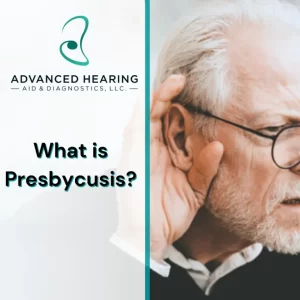
Most people may not have heard the term, but they probably are familiar with the condition. Presbycusis is the technical/medical term for an age-related hearing loss. In fact, hearing loss is the third most common chronic health complaint among older adults (heart disease and arthritis being numbers 1 and 2 respectively).
Our audiologist has years of experience using the most advanced technology to diagnose and treat age-related hearing loss, we use state-of-the-art treatment methods to provide our patients with the highest quality care in Corpus Christi, TX and surrounding areas Alice, Beeville, Kingsville, Victoria, Robstown, Port Aransas, and several other cities.
It is normal to lose a little hearing ability as we age. This loss can be an overall lack of sensitivity to certain sounds, most commonly high-pitched sounds, or even a decrease in our ability to understand or process what we hear (clarity). The amount of hearing we lose as we age is dependent on several factors. Age-related hearing loss can be complicated by noise exposure, family history, diseases/illnesses, medications, and any combination of these.
Think of it a little bit like a car or anything mechanical. Even with regular maintenance and service, parts wear out, need to be replaced, and in general, the device just doesn’t work as well as it once used to. The same thing happens to our bodies as we age. We probably all know someone who has had a knee replacement or a hip replacement. Why? Because the cushioning in the joints has been worn away and now they have pain and don’t work well. With our sense organs, it works a little differently. We can’t easily go in and replace an ear or an eye when they start to wear out. While there are some surgeries for our eyes like cataract removal or Lasix, there is not anything equivalent for the ear. At least not yet! So we aid them. We start to wear hearing aids to hear better.
The age-related change in hearing is typically gradual and takes many years before it is noticed. In women, age-related hearing loss is typically first noticed in their 60s, while men typically start to see signs in their 50s. At first, it might be just missing a letter here or there or confusing one word for another. Maybe we have difficulty hearing birds during a hike or the beep our refrigerator makes to tell us the door is open. We might notice that we are having more difficulty hearing and understanding people if they are not looking at us, or if there is background noise like running water, or in a crowded restaurant. We start to ask people to repeat themselves and we start to turn up the volume on the TV or the radio. Many times it is our loved ones who remark on it before we notice it. Eventually, we find ourselves missing out on events and special events because we just can’t hear or understand what is said. That is sad.
As humans, we are social creatures. We use our hearing to connect with the world around us. If you feel like you might be missing out on conversations, call our office and schedule a hearing test.